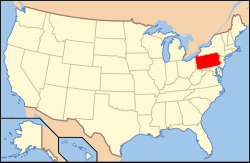Pennsylvania Dutch Country
Pennsylvanie Deitschland | |
|---|---|
Region of Pennsylvania | |
 German (High-Dutch) Pennsylvania | |
 Map of the Pennsylvania Dutch Country (red) | |
 Location of Pennsylvania within the United States | |
| Country | United States |
| State | Pennsylvania |
| Demonym | Pennsylvania Dutchlander[1][2][3] |
The Pennsylvania Dutch Country (Pennsylvania Dutch: Pennsylvanie Deitschland, Deitscherei, or Pennsilfaanisch-Deitschland), or Pennsylvania Dutchland,[4][5] is a region of German Pennsylvania spanning the Delaware Valley and South Central and Northeastern regions of Pennsylvania.
By the American Revolution in the 18th century, the region had a high percentage of Pennsylvania Dutch inhabitants. Religiously, they were predominantly Lutherans but also included German Reformed, Moravian, Amish, Mennonite, Schwarzenau Brethren, and other German Christian denominations. Catholics settled around early Jesuit missions in Conewago near Hanover and Goshenhoppen, now known as Bally. The term was used in the middle of the 20th century as a description of a region with a distinctive Pennsylvania Dutch culture, but in recent decades the composition of the population is changing and the phrase is used more now in a tourism context than any other.
The Greater Pennsylvania Dutch Country (Pennsylvania Dutch: Die Breet-Deitscherei (The Broad Dutchery) refers to this Pennsylvania region but also includes smaller enclaves of Pennsylvania Dutch-speaking areas in New York, Delaware, Maryland, Ohio, West Virginia, North Carolina, Indiana, Illinois, Wisconsin, Virginia, and the Canadian province of Ontario.[6][7][8]
- ^ Earl Francis Robacker (1965). Touch of the Dutchland. A.S. Barnes. pp. 200, 240.
- ^ Pennsylvania Dutch Folklore Center (1958). Pennsylvania Folklife, Volumes 9 to 10. A.S. Barnes. p. 28.
- ^ Timothy J. Orr (1965). Last to Leave the Field: The Life and Letters of First Sergeant Ambrose Henry Hayward, 28th Pennsylvania Volunteers. Univ. of Tennessee Press. p. 28.
- ^ Pennsylvania-German Society (1891). Proceedings and Addresses, Volumes 1 to 2. Pennsylvania-German Society. p. 35.
- ^ Elmer Lewis Smith (1966). The Folk Art of Pennsylvania Dutchland. Applied Arts. p. 41.
- ^ Steven M. Nolt (March 2008). Foreigners in their own land: Pennsylvania Germans in the early republic. p. 13. ISBN 9780271034447.
- ^ Mark L. Louden (2016). Pennsylvania Dutch: The Story of an American Language. United States of America: JHU Press. p. 404.
- ^ Robert L. Schreiwer, Ammerili Eckhart (2012). A Dictionary of Urglaawe Terminology. United States of America: Lulu.com. p. 12.

